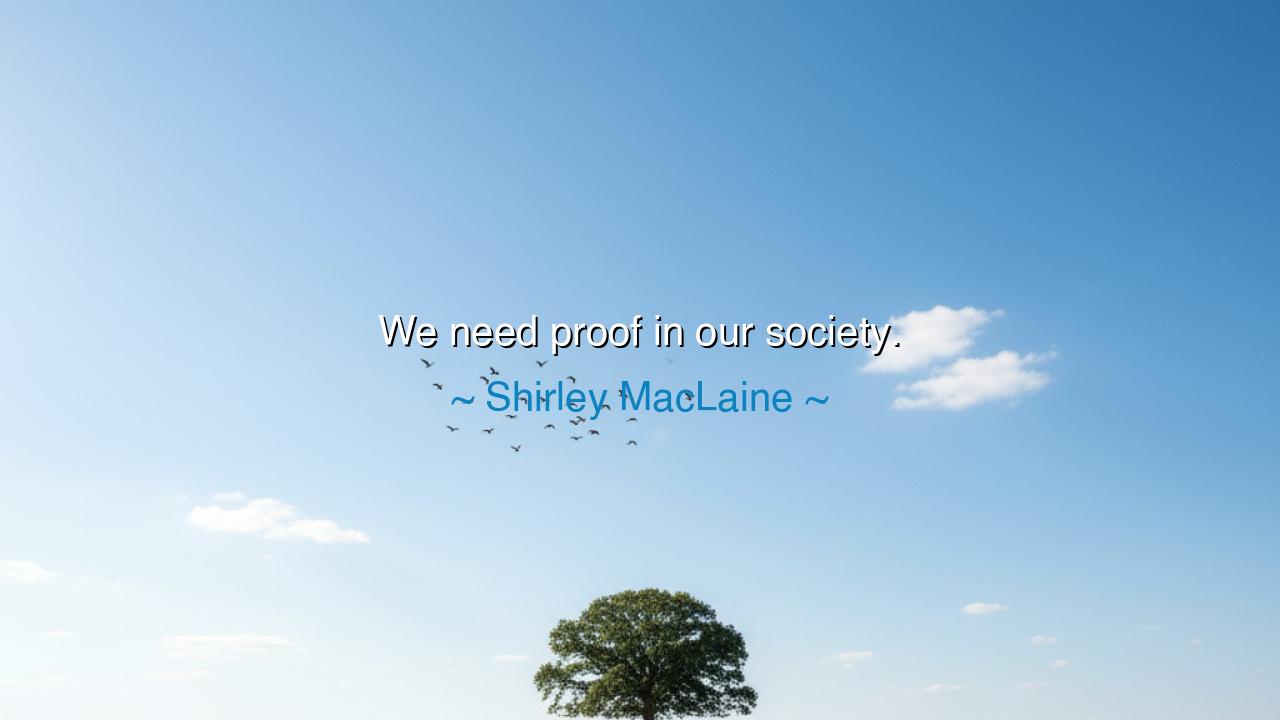
We need proof in our society.






The words of Shirley MacLaine—“We need proof in our society.”—resound with both simplicity and weight, for they touch upon the eternal struggle between belief and evidence, between rumor and truth, between illusion and reality. In every age, people have been tempted to cling to untested claims, to be swayed by passion, fear, or manipulation. Yet MacLaine reminds us that for a society to endure, for justice to be preserved and wisdom to grow, it must be built not on shadows but on proof. Without proof, the foundation of civilization cracks, and chaos enters in disguise as truth.
The ancients themselves knew this struggle well. In the courts of Athens, when men stood accused, it was not enough for orators to stir the crowd with eloquence or fire. They were required to present evidence, witnesses, and proof. For they knew that if justice was left to emotion alone, the innocent could perish, and the guilty could walk free. The philosopher Aristotle taught that persuasion by reason was greater than persuasion by passion, for reason could be tested, challenged, and confirmed. Thus, even in ancient times, the demand for proof was seen as the safeguard of order.
History offers countless examples where the absence of proof led to destruction. Consider the Salem witch trials of the seventeenth century. Hysteria, rumor, and accusation were taken as truth, and innocent lives were condemned without evidence. Fear triumphed over proof, and society descended into madness. Only later, when reason reasserted itself, did the people realize the enormity of their error. From such tragedies comes the enduring lesson: that to abandon proof is to open the gates to injustice.
Shirley MacLaine, known as both actress and seeker of spiritual truths, spoke these words from the vantage of one who straddled both the worlds of imagination and reality. While she explored mysteries beyond the physical realm, she understood that society itself cannot be governed by speculation. For while individuals may dream, hope, and believe, the collective life of a people—their laws, their science, their governance—must rest upon what can be shown, tested, and demonstrated. Her call is not to abandon wonder, but to ensure that society itself does not fall prey to deception.
This teaching carries deep wisdom for our own time. We live in an age where rumors spread faster than facts, where falsehoods can circle the world before truth has spoken a word. Without a commitment to proof, society risks division, manipulation, and collapse. Proof is not only about evidence in a court or data in science—it is about cultivating a culture where truth is valued above convenience, and facts are held higher than feelings. For only in such a culture can trust endure.
The lesson for us is clear: seek proof before belief, evidence before judgment. Do not let passion, fear, or prejudice dictate your conclusions. In your conversations, your debates, your decisions, ask always: What is the proof? To do so is not cynicism, but wisdom. For proof disciplines the mind, sharpens the conscience, and protects the innocent. To demand proof is to defend both justice and truth.
Practically, this means becoming guardians of truth in our daily lives. Before sharing words, ask if they are grounded in evidence. Before condemning, ask if the facts are known. Before believing, seek out verification. And in doing so, teach others—especially the young—that society survives not by rumor but by reason. For while the human heart may live on hope, the body of society lives on proof.
Thus, Shirley MacLaine’s words endure as a timeless command: “We need proof in our society.” Let us take them to heart, for in proof lies justice, in proof lies trust, and in proof lies the very survival of civilization itself. Without it, we are tossed like leaves in the storm of falsehood. With it, we stand as a people firm upon the rock of truth.






AAdministratorAdministrator
Welcome, honored guests. Please leave a comment, we will respond soon